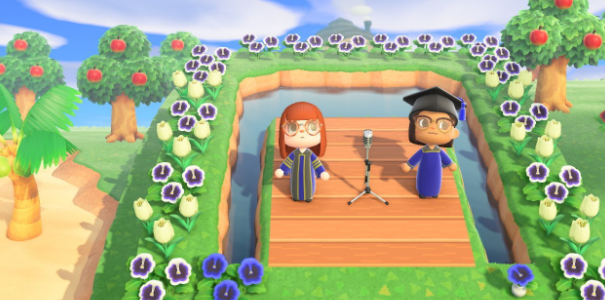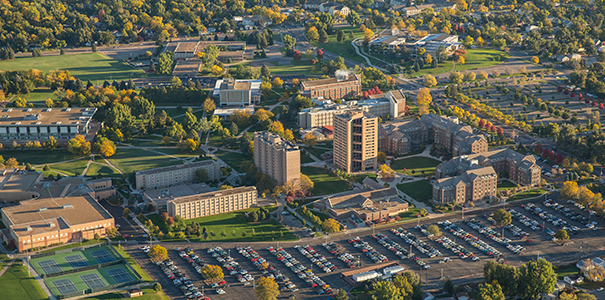
The image above is a screenshot of Joanna Lewis and Mia Trojovsky in the game "Animal Crossing: New Horizons," celebrating Trojovsky’s graduation from UNC in 2020 with her bachelor’s degree in Psychology.
—Written by Deanna Herbert
Challenging the widely popular belief that often holds video games and their players in a negative light, two UNC faculty members and a UNC graduate student published research they hope influences the perspective that social video games can have a positive impact on an individual, particularly those with higher anxiety.
Molly Jameson, Ph.D., associate professor of Psychological Sciences; Joanna Lewis, Ph.D. assistant professor of Psychological Sciences and Mia Trojovsky, a graduate student in the Marriage, Couples and Family Counseling /Therapy master’s program, recently published “New Social Horizons: Anxiety, Isolation, and Animal Crossing During the COVID-19 Pandemic." Released March 30, 2021 in Frontiers in Virtual Reality, the article explores the relationship between the social game, “Animal Crossing: New Horizons” (ACNH), and feelings of anxiety or isolation during the initial onset of the COVID-19 pandemic.
“Collectively we were interested in assessing the potential benefits of social gaming on acute societal stress,” Lewis said.
“The fortuitous nature of the ACNH March 2020 release coinciding with social isolation due to the pandemic allowed us the opportunity to explore this relationship during a collectively stressful event,” Jameson added.
The motivation behind the project was their shared interest in anxiety and technology. Lewis’ interests include how anxiety may impact attention and the influence of attention and interactions with technology. Her past research includes evaluating the influence video games have on human cognition. Jameson's interests are in anxiety and learning and ways to decrease anxiety in non-clinical settings. Her work typically addresses academic anxiety and exploring how technology may affect learning in highly anxious students.
In ACNH, players start with their own deserted island, working to enhance the aesthetics of their surroundings to create their own island community. Players can interact with nonplayable island residents and play cooperatively with other real-life players.
“ACNH limits the gameplay interactions to minimal text communications,” Lewis said. “It’s mainly contributive interactions and focuses on community for real or simulated peer interactions. All of which may foster more anxiety during in-person social experiences, while the digital sphere may provide these social opportunities with reduced anxiety.”
In the study, players were asked questions about their experiences related to their video game habits and their engagement with ACNH before and during the pandemic, in addition to questions about their feelings regarding anxiety and loneliness.
Based on past research, the team predicted that players who engaged more with the game would have decreased feelings of loneliness and anxiety, but that wasn’t the case. They actually found the opposite; increased hours of game play resulted in higher feelings of loneliness and anxiety –a finding that could very well have been the result of how or why people were using the game, such as for a coping mechanism, rather than the experience of gaming itself.
"We found that participants with higher levels of anxiety were likely to engage in certain social aspects of ACNH, perhaps suggesting that these individuals were using the social aspects of the game as a substitute for in-person interaction during the pandemic,” Jameson said.
Jameson and Lewis both agree that more work needs to be done to fully understand the impact of social gaming.
“The key to this research is establishing that there is a relationship between social gaming and anxiety and loneliness,” Lewis said. “We can’t yet say the direction of the impact, but social gaming may be particularly consequential or a coping mechanism for those with higher anxiety, which is something that should continue to be studied.”
The two are currently developing follow-up work regarding gaming and isolation/anxiety in regard to social games, as well as emotion regulation and avoidance.
More Stories
-
Governor Polis Reappoints Monfort and Campos-Spitze to UNC’s Board of Trustee
Este artículo no está en español.
-
Research Explores How Media Can Serve as a Lens for Social Transformation
Este artículo no está en español.
-
UNC Choirs Brings Together Guest Musicians, Alumni, Students and Faculty for Major Works
Este artículo no está en español.
-
Week-Long Celebration to Honor First-Generation College Students
Este artículo no está en español.





